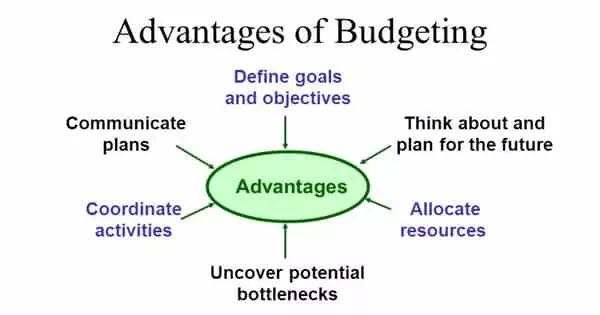The process of developing a budget forces management to think beyond the short-term, day-to-day operations of the business. This is the primary goal of budgeting; even if management does not meet its budgeted goals, it is thinking about the company’s competitive and financial position and how to improve it.
Advantages of Budgeting
The following main arguments are usually given for budgeting or following are the main advantages of budgeting.
(a) Budgeting necessitates early consideration of fundamental policies. During the flurry of day-to-day management, it is easy to lose sight of where a company makes the majority of its money.
(b) It necessitates an adequate and sound organizational structure, i.e., a clear assignment of responsibility for each enterprise function. A properly structured budget identifies which aspects of the business generate money and which ones consume it, forcing management to consider whether some aspects of the business should be eliminated while others expanded.
(c) Budgeting requires all members of management, from the top down, to participate in the development of goals and plans. The budgeting process forces management to consider why the company exists, as well as its key assumptions about the business environment.
(d) Budgeting forces departmental managers to make plans that are in sync with the other departments and the overall enterprise. You can work with employees to set their budgeting goals and possibly tie bonuses or other incentives to how they perform.
(e) Budgeting assists management in putting down in numbers what is required for satisfactory performance. It assists management in making the most cost-effective use of labor, materials, and capital.
(f) Budgeting tends to dispel the cloud of uncertainty that exists in many organizations, particularly at the lower levels of management, in terms of basic policies and objectives. It promotes management members’ understanding of their coworkers’ problems.
(e) Budgeting compels management to pay close attention to the effects of overall business conditions. It aids in the acquisition of bank credit because banks frequently require a projection of future operations and cash flows to support loans.
(f) Budgeting monitors progress toward the enterprise’s goals. There is only a limited amount of cash available to invest in fixed assets and working capital, and the budgeting process forces management to choose which assets are most valuable to invest in.
A budget is a comprehensive financial plan that lays out the expected path for your company’s financial and operational goals. Budgeting is a critical component of effective financial planning. Even the smallest company can benefit from creating a formal written plan for its future operations.
















